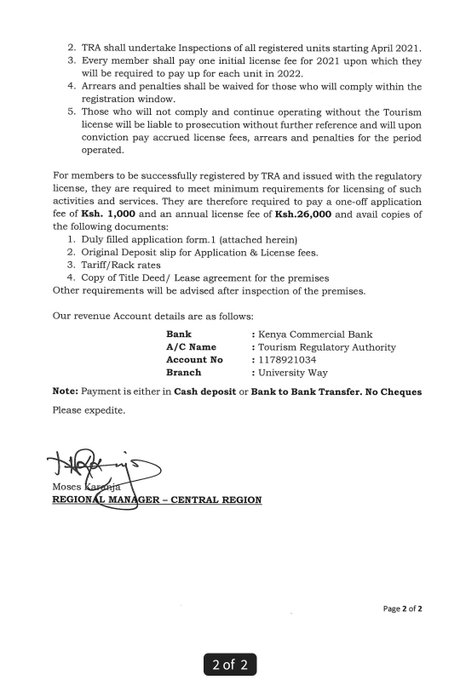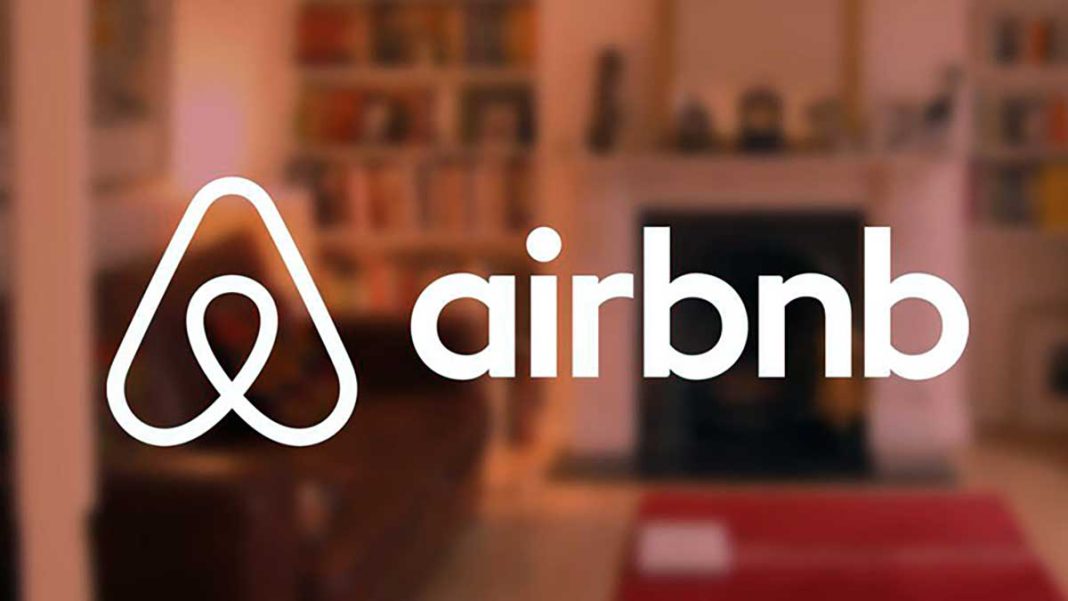Airbnb has been a lucrative business in Kenya over the past few years. The story is about to change for small and middle income operators of serviced apartments.
Airbnb and furnished apartment owners must now register with the Tourism Regulatory Authority and pay taxes.
This is how all operators of this industry will go underground, except the mainstream traceable hotel lines.
For members to be successfully registered by TRA and issued with the regulatory license, they are required to meet minimum requirements for licensing of such activities and services
Moses Karanja, TRA Central Regional manager
Homestay operators must now pay a one-time registration fee of Ksh1,000 and an annual licensing fee of Ksh26,000 per facility, as well as have copies of such records.
A completed application form; an initial deposit slip for application and licensing fees; tariff/rack rates; and a copy of the title deed/lease arrangement for the premises are all required documents.
An operator must have home insurance in order to obtain a license from the regulatory authority.


Kenya Is Not Alone
According to the Israel Tax Authority, landlords who rent out apartments to short-term tourists could pay more tax; if the regulation is upheld, it could limit the amount of properties accessible in Israel via Airbnb and related platforms.
For the third summer in a row, tax inspectors booked apartments online, visited the tenants, and provided them with tax demands on undeclared wages, according to the Israeli business daily Globes.
Today there are more than 8,955 Tel Aviv vacation homes listed on Airbnb alone but the number of hotel rooms has risen to only about 7,883, according to the Central Bureau of Statistics.
Last year, British officials imposed an additional tax bill of 1.8 million pounds ($2.3 million) on Airbnb UK.
The tax affairs of the U.S. firm have attracted increased attention internationally as it has expanded into one of the digital economy’s marquee brands with a sector that has transformed the hospitality industry by connecting travelers with tenants that have rooms or whole properties to rent for short-term stays.
The Rise of Airbnb
After its inception in 2008, it has grown in popularity as a hotel replacement. The online hospitality service links visitors to local hosts by providing a marketplace for authentic places to stay.
But how many people use it, and in what ways?
How many hosts does it have worldwide in 2021?
- According to our data analysis there are 2.9 million hosts on Airbnb worldwide in 2021.
- 14,000 new hosts are joining the platform each month in 2021.
- There are over 7 million listings on Airbnb worldwide in 2021.
- There are 100,000 cities with active Airbnb listings in 2021.
- There are 220 countries and regions with active Airbnb listings in 2021.
Airbnb History
- Co-founder Joe Gebbia’s apartment in San Francisco was the first Airbnb listing.
- The iPhone app launched in the year 2010 with an instant book feature.
- A year later, in 2011, Airbnb expanded internationally.
- Airbnb hosted over 100,000 guests during the Rio World Cup.
- On May 25, 2015, the White House appointed Brian Chesky as Presidential Ambassador for Global Entrepreneurship.
What Is Airbnb & How Does It Work?
Airbnb stands for Air Bed and Breakfast. In 2007, roommates Joe Gebbia and Brian Chesky needed some cash, and they took advantage of a San Francisco design conference.
Because people had booked all of the local hotels, they decided to buy three air mattresses and rent them out.
They started a website called AirBedandBreakfast.com and charged guests $80 per night to sleep on the air mattresses. They then took their idea to a bigger scale, eventually becoming the company we know today.
The website operates as an online marketplace for people who are looking for accommodations.
It connects travelers with Airbnb hosts who want to rent out their homes or other property.
For guests, it gives affordable temporary housing options and sometimes fun activities. For hosts, it is a way to earn extra money.
After the 2008 launch, Brian Chesky and Joe Gebbia added Brian’s former roommate, Nathan Blecharczyk, to the operation.
They shortened the name to Airbnb and, expanded their offerings to private rooms, houses, apartments, and more.

